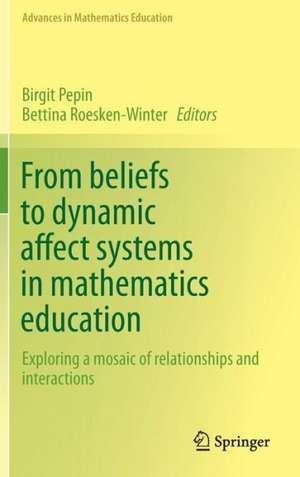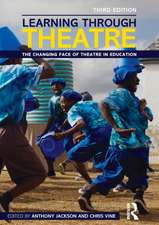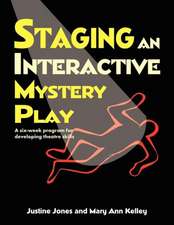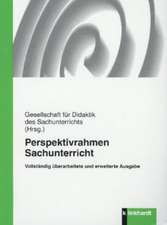From beliefs to dynamic affect systems in mathematics education: Exploring a mosaic of relationships and interactions: Advances in Mathematics Education
Editat de Birgit Pepin, Bettina Roesken-Winteren Limba Engleză Hardback – 4 noi 2014
Investigated by internationally renowned scholars, the book is build up in three dimensions. The first part of the book provides an overview of selected theoretical frames - theoretical lenses - to study the mosaic of relationships and interactions in the field of affect. In the second part the theory is enriched by empirical research studies and provides relevant findings in terms of developing deeper understandings of individuals’ and collectives’ affective systems in mathematics education. Here pupil and teacher beliefs and affect systems are examined more closely. The final part investigates the methodological tools used and needed in affect research. How can the different methodological designs contribute data which help us to develop better understandings of teachers’ and pupils’ affect systems for teaching and learning mathematics and in which ways are knowledge and affect related?
| Toate formatele și edițiile | Preț | Express |
|---|---|---|
| Paperback (1) | 646.75 lei 43-57 zile | |
| Springer International Publishing – 10 sep 2016 | 646.75 lei 43-57 zile | |
| Hardback (1) | 653.14 lei 43-57 zile | |
| Springer International Publishing – 4 noi 2014 | 653.14 lei 43-57 zile |
Din seria Advances in Mathematics Education
- 15%
 Preț: 648.24 lei
Preț: 648.24 lei - 18%
 Preț: 905.06 lei
Preț: 905.06 lei - 15%
 Preț: 660.04 lei
Preț: 660.04 lei - 18%
 Preț: 959.98 lei
Preț: 959.98 lei - 15%
 Preț: 642.51 lei
Preț: 642.51 lei - 15%
 Preț: 661.97 lei
Preț: 661.97 lei - 15%
 Preț: 657.57 lei
Preț: 657.57 lei - 24%
 Preț: 1337.47 lei
Preț: 1337.47 lei - 20%
 Preț: 581.65 lei
Preț: 581.65 lei - 15%
 Preț: 665.58 lei
Preț: 665.58 lei - 24%
 Preț: 647.54 lei
Preț: 647.54 lei - 18%
 Preț: 1127.28 lei
Preț: 1127.28 lei - 18%
 Preț: 1129.02 lei
Preț: 1129.02 lei - 15%
 Preț: 656.89 lei
Preț: 656.89 lei - 18%
 Preț: 786.04 lei
Preț: 786.04 lei - 18%
 Preț: 1024.53 lei
Preț: 1024.53 lei - 15%
 Preț: 656.43 lei
Preț: 656.43 lei - 18%
 Preț: 1134.06 lei
Preț: 1134.06 lei - 24%
 Preț: 842.57 lei
Preț: 842.57 lei - 18%
 Preț: 898.26 lei
Preț: 898.26 lei - 18%
 Preț: 957.62 lei
Preț: 957.62 lei - 24%
 Preț: 991.37 lei
Preț: 991.37 lei - 24%
 Preț: 785.09 lei
Preț: 785.09 lei - 18%
 Preț: 1009.54 lei
Preț: 1009.54 lei - 18%
 Preț: 1013.96 lei
Preț: 1013.96 lei - 24%
 Preț: 790.73 lei
Preț: 790.73 lei - 24%
 Preț: 797.39 lei
Preț: 797.39 lei
Preț: 653.14 lei
Preț vechi: 768.40 lei
-15% Nou
Puncte Express: 980
Preț estimativ în valută:
125.02€ • 135.84$ • 105.08£
125.02€ • 135.84$ • 105.08£
Carte tipărită la comandă
Livrare economică 21 aprilie-05 mai
Preluare comenzi: 021 569.72.76
Specificații
ISBN-13: 9783319068077
ISBN-10: 3319068075
Pagini: 300
Ilustrații: XIX, 407 p. 47 illus.
Dimensiuni: 155 x 235 x 27 mm
Greutate: 0.77 kg
Ediția:2015
Editura: Springer International Publishing
Colecția Springer
Seria Advances in Mathematics Education
Locul publicării:Cham, Switzerland
ISBN-10: 3319068075
Pagini: 300
Ilustrații: XIX, 407 p. 47 illus.
Dimensiuni: 155 x 235 x 27 mm
Greutate: 0.77 kg
Ediția:2015
Editura: Springer International Publishing
Colecția Springer
Seria Advances in Mathematics Education
Locul publicării:Cham, Switzerland
Public țintă
ResearchCuprins
Gilah Leder: Preface: From ‘hidden variable’ to ‘dynamic systems’ in affect research: reviewing the developments in belief and affect research.- Introduction: the editors.- Section 1: Theoretical lenses in affect research.- Jeppe Skott: Towards a participatory approach to affect in mathematics education.- Luis Radford: Of Love, Frustration, and Mathematics: A Cultural-Historical Approach to Emotions in Mathematics Teaching and Learning.- Pietro Di Martino & Rosetta Zan: The construct of attitude in mathematics education.- Bettina Roesken-Winter & Katrin Rolka: Beliefs and their crucial role in mathematics education.- George N. Philippou & Marilena Pantziara: Developments in mathematics teachers’ efficacy beliefs.- Reaction to section 1: David Clarke.- Section 2: Relevance in the field - affective systems of individuals and ‘collectives’.- Fien Depaepe, Erik De Corte & Lieven Verschaffel: Students’ non-realistic mathematical modeling as a drawback of teachers’ beliefs about and approaches to word problem solving.- Liping Ding, Birgit Pepin & Keith Jones: Students’ attitudes towards mathematics across different lower secondary schools in Shanghai.- Andreas Eichler & Ralf Erens : Domain-specific belief systems of (secondary) mathematics teachers.- Inés M. Gómez-Chacón: Meta-emotion and mathematical modelling processes in computerized environments.- Sigrid Blömeke & Gabriele Kaiser: Effects of motivation on the belief systems of future mathematics teachers from a comparative perspective.- H. Forgasz, G. Leder, D. Mittelberg, H. Tan & A. Murimo): Affect and gender.- Reaction to section 2: Markku S. Hannula.- Section 3: Methodological issues in affect research.- Qien Chen & Frederick K.S. Leung: Analyzing Data and Drawing Conclusion on Teachers’ Beliefs.- Sebastian Kuntz & Anika Dreher: PCK and the awareness of affective aspects reflected in teachers’ views about learning opportunities – aconflict?-Pessia Tsamir, Dina Tirosh, Esther Levenson, Michal Tabach & Ruthi Barkai: Pre-school teachers’ knowledge and self-efficacy needed for teaching mathematics: Are they related?- Chiara Andra: Title: A specific language towards a new conceptual framework for networking methodologies in the field of affect.- Emmanuel Adu-tutu Bofah & Markku S. Hannula: Title: Studying the factorial structure of Ghanaian twelfth-grade students’ views on mathematics.- Reaction to section 3: Kenneth Ruthven.- Conclusions/closing reaction: A. H. Schoenfeld.
Textul de pe ultima copertă
This book connects seminal work in affect research and moves forward to provide a developing perspective on affect as the “decisive variable” of the mathematics classroom. In particular, the book contributes and investigates new conceptual frameworks and new methodological ‘tools’ in affect research, and introduces the new field of ‘collectives’ to explore affect systems in diverse settings.
Investigated by internationally renowned scholars, the book is build up in three dimensions. The first part of the book provides an overview of selected theoretical frames - theoretical lenses - to study the mosaic of relationships and interactions in the field of affect. In the second part the theory is enriched by empirical research studies and provides relevant findings in terms of developing deeper understandings of individuals’ and collectives’ affective systems in mathematics education. Here pupil and teacher beliefs and affect systems are examined more closely. The final part investigates the methodological tools used and needed in affect research. How can the different methodological designs contribute data which help us to develop better understandings of teachers’ and pupils’ affect systems for teaching and learning mathematics, and in which ways are knowledge and affect related?
Investigated by internationally renowned scholars, the book is build up in three dimensions. The first part of the book provides an overview of selected theoretical frames - theoretical lenses - to study the mosaic of relationships and interactions in the field of affect. In the second part the theory is enriched by empirical research studies and provides relevant findings in terms of developing deeper understandings of individuals’ and collectives’ affective systems in mathematics education. Here pupil and teacher beliefs and affect systems are examined more closely. The final part investigates the methodological tools used and needed in affect research. How can the different methodological designs contribute data which help us to develop better understandings of teachers’ and pupils’ affect systems for teaching and learning mathematics, and in which ways are knowledge and affect related?
Caracteristici
Discusses development of the field 'affect, beliefs and attitude' since 2002 Presents new conceptual frame words in affect research Provides new methodological 'tools' in affect research introduces the new field of 'collectives' and affect research Includes supplementary material: sn.pub/extras








